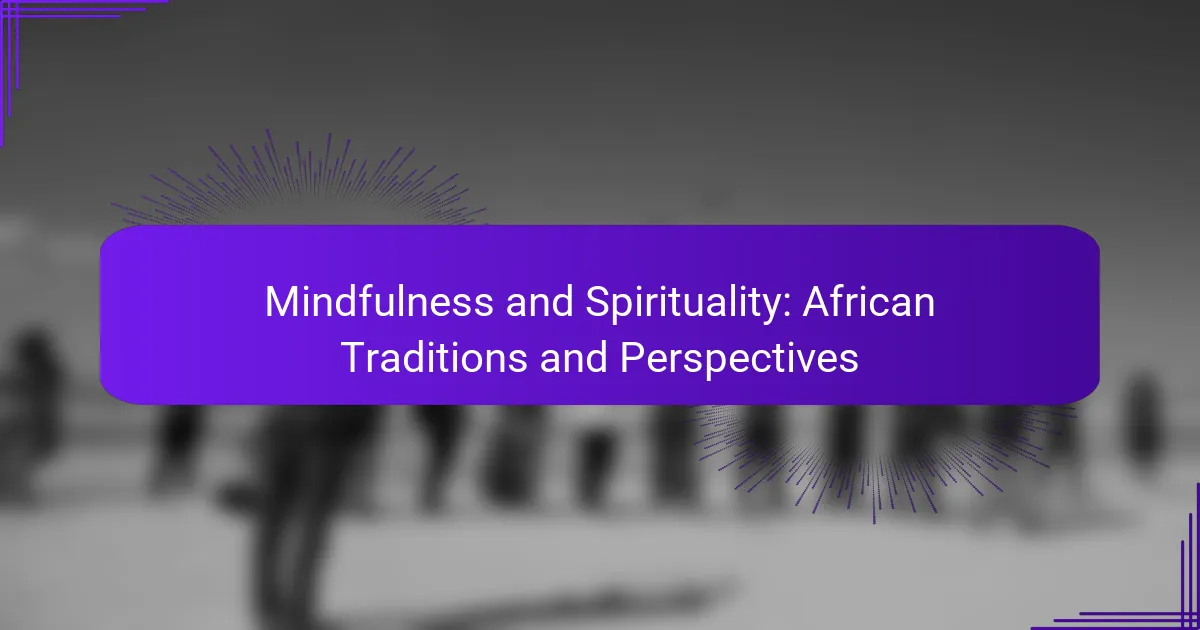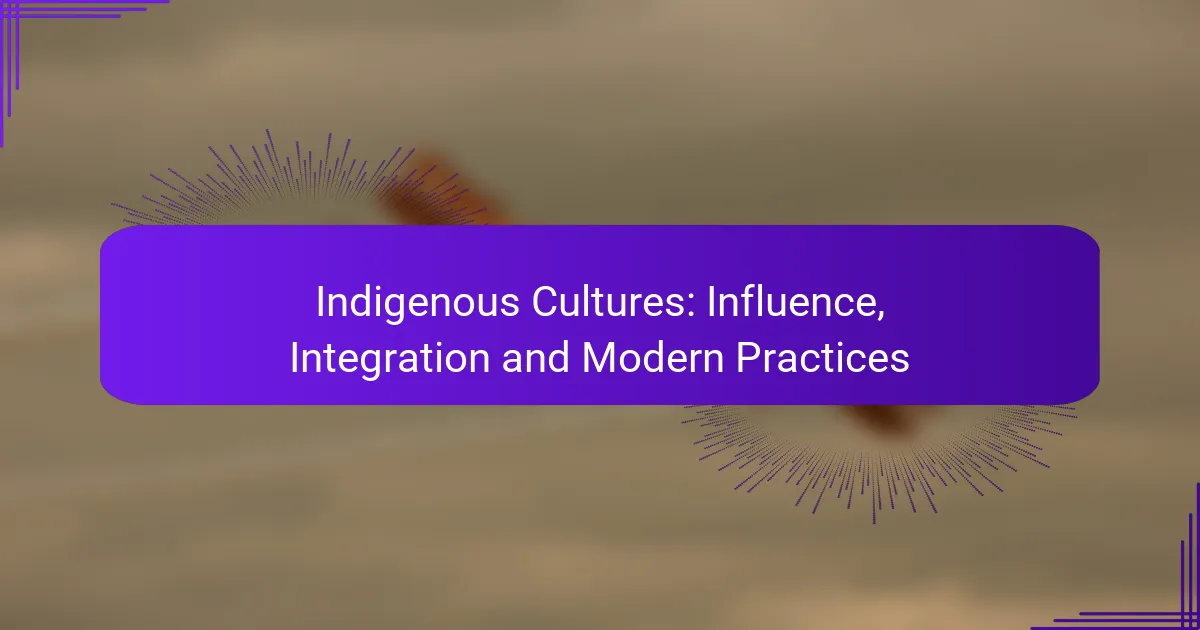African traditions offer a unique perspective on mindfulness, rooted in a profound connection to nature, community, and spirituality. By incorporating techniques such as breathwork, meditative drumming, and dance, these practices promote a holistic approach that nurtures mental, emotional, and spiritual well-being. This integration not only enhances individual mindfulness but also deepens one’s spiritual growth and understanding within the community context.

How do African traditions influence mindfulness practices?
African traditions significantly shape mindfulness practices by emphasizing a deep connection to nature, community, and spirituality. These elements foster a holistic approach to mindfulness that integrates mental, emotional, and spiritual well-being.
Connection to nature
In many African cultures, nature is viewed as a vital source of wisdom and healing. Mindfulness practices often involve spending time outdoors, engaging with the environment, and recognizing the interconnectedness of all living things. This connection encourages individuals to be present and aware of their surroundings.
Practices such as walking barefoot on the earth or meditating under a tree are common. These activities promote grounding and help individuals cultivate a sense of peace and belonging within the natural world.
Community rituals
Community rituals play a crucial role in African mindfulness practices, as they foster a sense of belonging and shared experience. Group activities, such as drumming circles or communal dances, create opportunities for collective mindfulness, enhancing emotional connections among participants.
These rituals often involve storytelling or sharing personal experiences, which can deepen understanding and empathy within the community. Engaging in such practices can help individuals feel more supported and connected, reinforcing their mindfulness journey.
Spiritual teachings
African spiritual teachings often emphasize the importance of inner peace and self-awareness. Many traditions incorporate meditation, prayer, and reflection as tools for personal growth and understanding. These practices encourage individuals to explore their inner selves and align with their spiritual beliefs.
Incorporating elements such as affirmations or mantras derived from local languages can enhance mindfulness practices. This approach not only honors cultural heritage but also deepens the individual’s connection to their spiritual path.
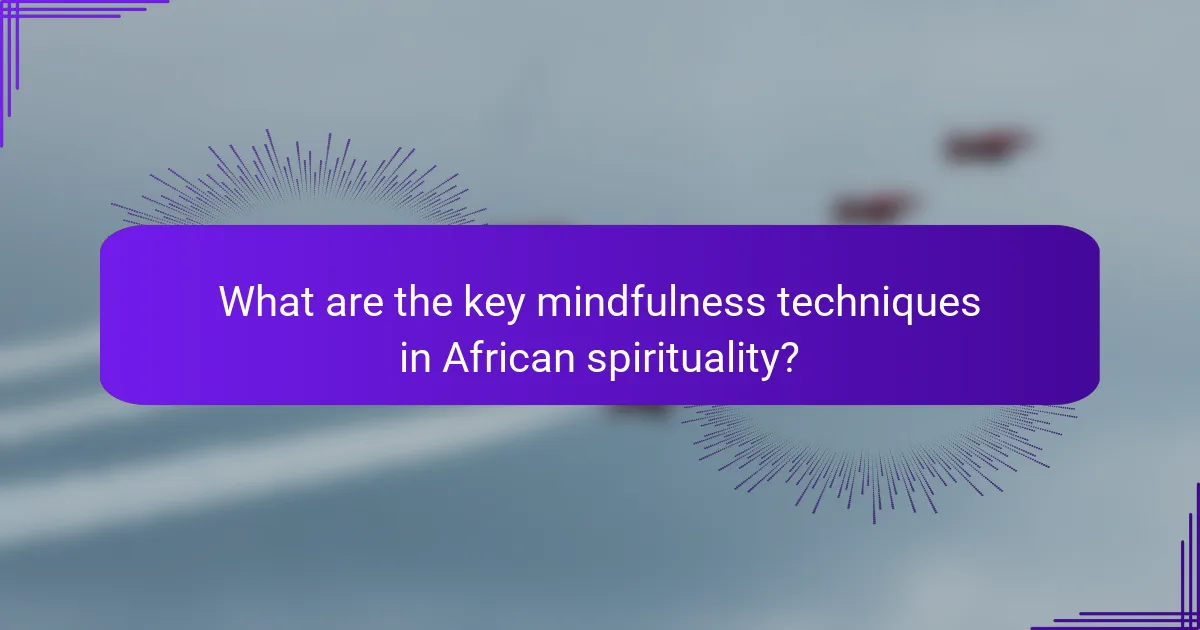
What are the key mindfulness techniques in African spirituality?
Key mindfulness techniques in African spirituality include breathwork, meditative drumming, and dance as meditation. These practices emphasize connection to the self, community, and the spiritual realm, fostering a holistic approach to mindfulness.
Breathwork
Breathwork in African spirituality involves intentional breathing techniques that promote relaxation and awareness. Practitioners often use rhythmic breathing patterns to center themselves, connecting with their inner spirit and the surrounding environment.
To practice breathwork, find a quiet space, sit comfortably, and focus on your breath. Inhale deeply through the nose for a count of four, hold for a count of four, and exhale through the mouth for a count of six. Repeat this cycle for several minutes to enhance mindfulness.
Meditative drumming
Meditative drumming is a powerful technique used in various African traditions to facilitate mindfulness and spiritual connection. The repetitive beats of drums create a rhythmic soundscape that helps practitioners enter a meditative state, allowing for deeper introspection.
To incorporate drumming into your practice, use a hand drum or any percussion instrument. Begin by playing a steady beat, gradually increasing the tempo as you become more comfortable. Focus on the sound and vibration, letting it guide your thoughts and feelings.
Dance as meditation
In African spirituality, dance serves as a form of meditation that combines physical movement with spiritual expression. This practice encourages participants to connect with their bodies and the rhythms of life, fostering a sense of unity with the universe.
To practice dance as meditation, choose music that resonates with you and allows for free movement. Close your eyes and let your body respond to the rhythm, focusing on the sensations and emotions that arise. Aim to dance for at least 10-15 minutes to fully immerse yourself in the experience.
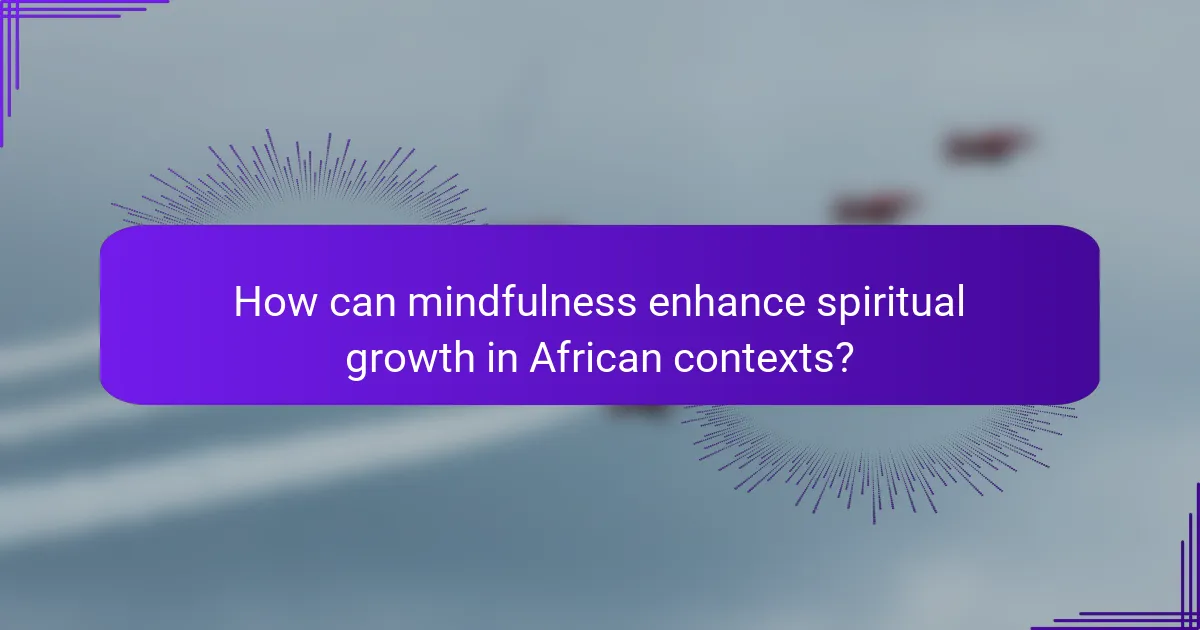
How can mindfulness enhance spiritual growth in African contexts?
Mindfulness can significantly enhance spiritual growth in African contexts by fostering a deeper connection to oneself and the community. It encourages individuals to reflect on their thoughts and emotions, leading to a more profound understanding of their spiritual beliefs and practices.
Increased self-awareness
Mindfulness practices, such as meditation and reflection, promote increased self-awareness by encouraging individuals to observe their thoughts and feelings without judgment. This heightened awareness allows individuals to recognize patterns in their behavior and emotions, facilitating personal growth and spiritual development.
For instance, a person may discover through mindfulness that certain reactions stem from unresolved issues, prompting them to seek healing and understanding. Regular mindfulness practice can lead to a more authentic expression of one’s spiritual beliefs.
Deepened community bonds
In many African cultures, spirituality is closely tied to community. Mindfulness can enhance these communal ties by fostering empathy and understanding among individuals. When people practice mindfulness together, they create a shared space for reflection and connection, strengthening their relationships.
Participating in group mindfulness activities, such as communal prayers or meditative gatherings, can help individuals feel more connected to their community and its spiritual traditions. This collective experience reinforces the importance of unity in spiritual growth.
Alignment with ancestral wisdom
Mindfulness encourages individuals to connect with their roots and ancestral teachings, which are often rich in spiritual insights. By practicing mindfulness, individuals can reflect on the values and lessons passed down through generations, aligning their spiritual journey with these traditions.
For example, many African cultures emphasize the importance of nature and community in their spiritual practices. Mindfulness can help individuals appreciate these elements, leading to a more holistic understanding of their spirituality that honors their heritage.

What role do African deities play in mindfulness practices?
African deities are integral to mindfulness practices, serving as guides and sources of inspiration. They embody various aspects of life and nature, influencing rituals and meditative techniques that promote spiritual awareness and inner peace.
Symbolism in rituals
In African traditions, rituals often incorporate symbols associated with specific deities, which enhance the mindfulness experience. For example, offerings may be made to a deity representing fertility or wisdom, aligning the practitioner’s intentions with the divine. This connection fosters a deeper understanding of personal and communal values.
Common symbols include animal representations, natural elements, and crafted artifacts that hold cultural significance. These symbols serve as focal points during rituals, helping participants to center their thoughts and cultivate mindfulness.
Guidance in meditation
African deities provide guidance in meditation by offering archetypal narratives that practitioners can reflect upon. Meditative practices often involve visualizing these deities, which can evoke feelings of protection, clarity, or strength. This visualization aids in achieving a tranquil state of mind.
Additionally, many traditions emphasize the importance of chanting or reciting prayers dedicated to specific deities during meditation. This practice not only enhances focus but also reinforces the connection between the individual and the spiritual realm.
Connection to the spiritual realm
The presence of African deities in mindfulness practices fosters a profound connection to the spiritual realm. Practitioners often seek to communicate with these deities through prayer and meditation, creating a two-way relationship that enriches their spiritual journey. This connection can lead to insights and personal revelations.
Engaging with deities in this manner encourages a sense of belonging within a larger cosmic framework. It reminds practitioners that they are part of a rich tapestry of life, promoting a holistic approach to mindfulness that encompasses both the individual and the community.
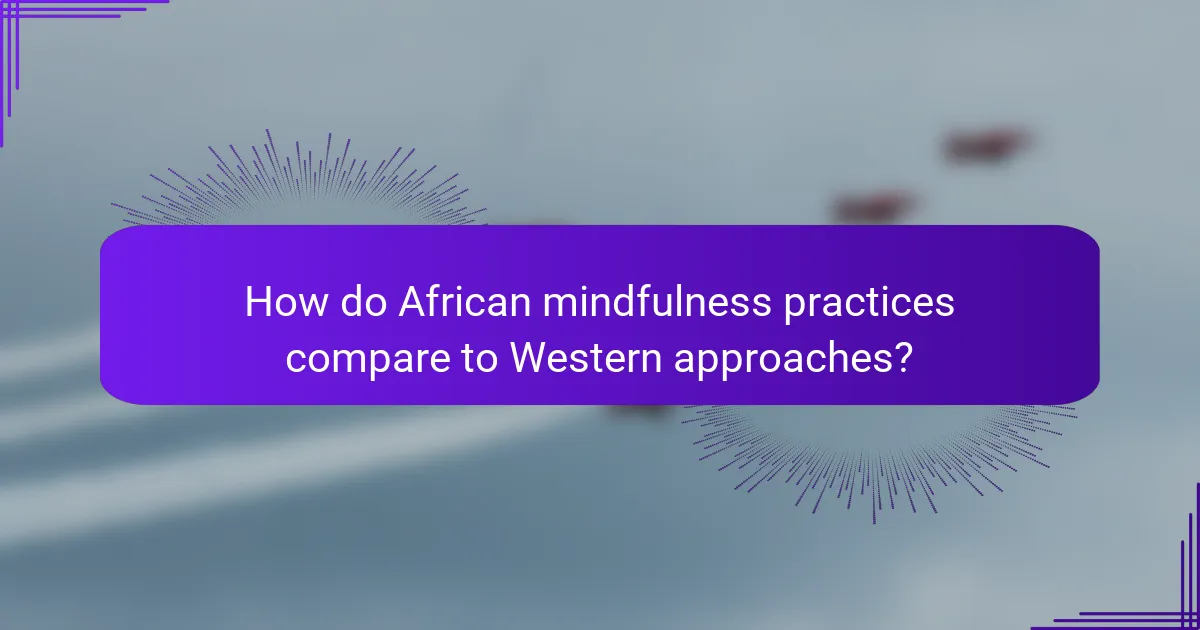
How do African mindfulness practices compare to Western approaches?
African mindfulness practices often emphasize community and spirituality, contrasting with the more individualistic and secular focus of many Western approaches. While both traditions aim to enhance well-being and awareness, their methodologies and underlying philosophies differ significantly.
Focus on community vs. individual
African mindfulness practices typically prioritize communal experiences, fostering connections among individuals. This collective approach is rooted in the belief that personal well-being is intertwined with the health of the community.
In contrast, Western mindfulness often emphasizes individual practices, such as meditation or yoga, where personal growth and self-awareness take center stage. This can lead to a more isolated experience, focusing on individual achievement rather than communal harmony.
Integration of spirituality
Spirituality plays a crucial role in many African mindfulness traditions, where practices are often linked to ancestral beliefs and cultural rituals. This integration fosters a deeper sense of purpose and connection to the spiritual world.
Western mindfulness, however, tends to separate spirituality from practice, focusing instead on psychological benefits. While some Western practitioners incorporate spiritual elements, they are generally less central to the overall approach.
Use of nature
African mindfulness practices frequently emphasize a strong connection to nature, viewing it as a source of wisdom and healing. Activities like walking in natural settings or engaging in traditional rituals often take place outdoors, reinforcing this bond.
In Western practices, while nature is acknowledged for its calming effects, it is often secondary to structured environments like studios or homes. This difference highlights a more holistic approach in African traditions, where nature is integral to the mindfulness experience.
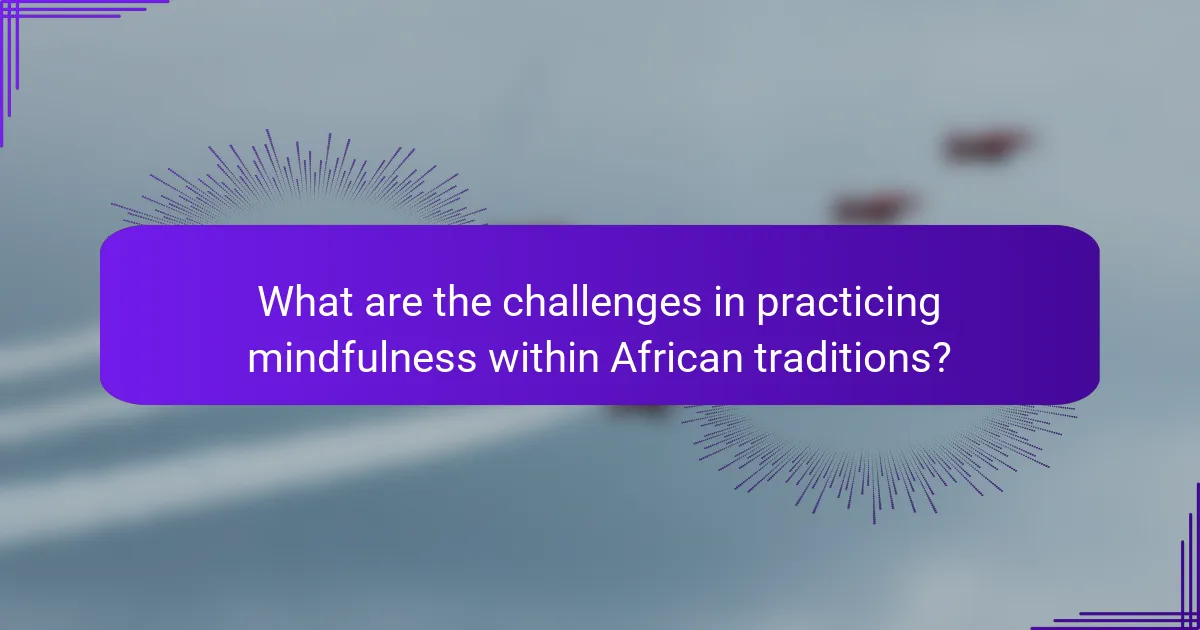
What are the challenges in practicing mindfulness within African traditions?
Practicing mindfulness within African traditions faces several challenges, including the impact of modernization, the erosion of traditional knowledge, and concerns about cultural appropriation. These factors can hinder the authentic expression and integration of mindfulness practices in contemporary African contexts.
Modernization effects
Modernization has significantly altered lifestyles in many African communities, often prioritizing rapid economic development over traditional practices. As urbanization increases, individuals may find it difficult to engage in mindfulness practices that require time and space for reflection, such as communal rituals or nature-based activities.
Additionally, the influence of Western culture can lead to a preference for quick-fix solutions over deeper, more meaningful mindfulness practices. This shift can dilute the essence of traditional mindfulness, making it less accessible to those who could benefit from it.
Loss of traditional knowledge
The loss of traditional knowledge is a critical challenge for mindfulness practices in Africa. As elders pass away and younger generations migrate to urban areas, valuable cultural practices and teachings may be forgotten or overlooked. This generational gap can lead to a disconnection from the roots of mindfulness that are deeply embedded in African spirituality.
Efforts to document and preserve these traditions are essential to ensure that future generations can access authentic mindfulness practices. Community workshops and storytelling sessions can serve as effective methods for transmitting this knowledge.
Cultural appropriation concerns
Cultural appropriation poses a significant concern when mindfulness practices are adopted without understanding their origins. This can lead to the commodification of African spiritual practices, stripping them of their cultural significance and reducing them to mere trends. Such actions can alienate those who hold these traditions dear.
To address these concerns, it is crucial for practitioners and educators to approach African mindfulness traditions with respect and a commitment to understanding their context. Engaging with local communities and seeking permission to share practices can help foster a more authentic and respectful exchange of cultural knowledge.
